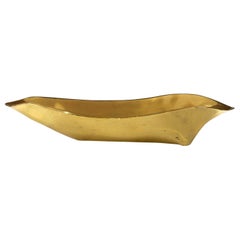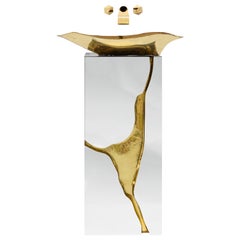Modern Lapiaz Vessel Sink
Recent Sales
21st Century and Contemporary Portuguese Modern Bathroom Fixtures
Gold, Copper, Nickel, Brass
21st Century and Contemporary Portuguese Modern Bathroom Fixtures
Brass, Steel, Stainless Steel
21st Century and Contemporary Portuguese Modern Bathroom Fixtures
Marble, Stainless Steel
21st Century and Contemporary Portuguese Modern Bathroom Fixtures
Brass
A Close Look at modern Furniture
The late 19th and early 20th centuries saw sweeping social change and major scientific advances — both of which contributed to a new aesthetic: modernism. Rejecting the rigidity of Victorian artistic conventions, modernists sought a new means of expression. References to the natural world and ornate classical embellishments gave way to the sleek simplicity of the Machine Age. Architect Philip Johnson characterized the hallmarks of modernism as “machine-like simplicity, smoothness or surface [and] avoidance of ornament.”
Early practitioners of modernist design include the De Stijl (“The Style”) group, founded in the Netherlands in 1917, and the Bauhaus School, founded two years later in Germany.
Followers of both groups produced sleek, spare designs — many of which became icons of daily life in the 20th century. The modernists rejected both natural and historical references and relied primarily on industrial materials such as metal, glass, plywood, and, later, plastics. While Bauhaus principals Marcel Breuer and Ludwig Mies van der Rohe created furniture from mass-produced, chrome-plated steel, American visionaries like Charles and Ray Eames worked in materials as novel as molded plywood and fiberglass. Today, Breuer’s Wassily chair, Mies van der Rohe’s Barcelona chair — crafted with his romantic partner, designer Lilly Reich — and the Eames lounge chair are emblems of progressive design and vintage originals are prized cornerstones of collections.
It’s difficult to overstate the influence that modernism continues to wield over designers and architects — and equally difficult to overstate how revolutionary it was when it first appeared a century ago. But because modernist furniture designs are so simple, they can blend in seamlessly with just about any type of décor. Don’t overlook them.
Finding the Right building-garden for You
Choosing the right antique or vintage building and garden elements can prove pivotal when you’re working to beautify any room in your home or just put the finishing touches on a garden or other outdoor area.
It takes time and effort to improve your outdoor space or merely to bring an air of tranquility to an indoor area set aside for private relaxation or gathering with friends. The good news is that 1stDibs can help.
To introduce a sense of timelessness to a back patio or interior common area, choose cast-stone statues or sculptural busts for a dose of drama or select ornate architectural elements such as corbels, plaques or panels made of marble or iron. Elsewhere, find a focal point in your living room and create a “feature wall” by bringing pops of color into a corner with handmade antique ceramic tiles.
It helps when design changes like these have a practical upside too.
Victorian cast-iron stair treads hearken back to a time when adding decorative details to your property was a priority. While lending an attractive appearance to an exterior staircase, these safeguards render the steps slip-resistant for those coming and going. And as one good stylistic choice usually leads to another, pairing your sophisticated treads with a coupling of 19th-century hand-forged andirons would be a thoughtful, durable touch for any courtyard or comfortable lounge space, be they intended for an indoor fireplace or a patio firepit.
Where the garden is concerned, any sophisticated garden ornaments you select should work with nature, not against it. Wrought-iron garden gates will simply refuse to be relegated to the background. Instead, they’ll draw attention to your painstakingly sculpted hedges and colorful flora. When paired with a sparse arrangement of other tasteful additions, such as a stone planter, garden stool or other welcoming pieces of outdoor seating, the effect can be transformative.
On 1stDibs, find a sprawling collection of antique garden furniture and architectural elements that meet every need. Our offerings include everything from sculptural bathroom fixtures to flooring ideas to pedestals and columns designed in a variety of styles and much more.

